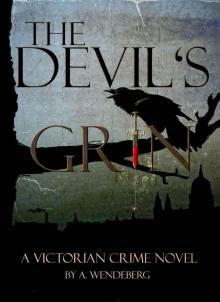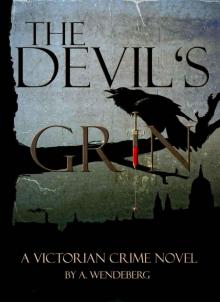- Home
- Annelie Wendeberg
Vow Page 3
Vow Read online
Page 3
My brain sounds like an empty cave, echoing “We are fucked, we are fucked,” with every breath I take. ‘Shut up!’ I growl, bite on my right mitten to pull it off so I can pull the manual from inside my anorak. I thumb through it, scanning for a section on the aircraft’s landing gear.
There it is. I leave the book open on the cockpit floor and jump out to check the undercarriage. Big mistake, opening my mouth in the process. The wind freezes my teeth.
With my face up close to the landing gear, I push at the parts that should move. A faint clanking sound comes from the torque links that align the cylinder in the nose gear strut. I wiggle at it, which nearly freezes my fingertips to the metal, so I tap at it with my boot instead. And that’s when the pin that connects the upper and lower torque links falls off and disappears into the snow.
Four
‘Landing gear is fine,’ I say when I shut the entrance to our hut.
Katvar’s eyes briefly bounce up before settling back on the SatPad in his lap. ‘This here says you didn’t crash-land. As long as the machine is still airworthy, it was a hard landing, not a crash.’ He is signing hastily without looking up from his reading. ‘Not that it matters. With the landing gear fully functional, we’ll just need to move the machine away from the jumbled ice out to the land-fast ice, and we can take off.’
‘Okay.’
That’s when he finally looks up. He cocks his head and narrows his eyes. ‘What are you not saying?’
‘Well, the…nose wheel is a bit… We can’t steer with it. But as long as we go straight ahead during takeoff, we’re fine. No problem.’
‘What about the ski?’
‘It’s a goner.’
A shudder racks his body. He draws the bear pelt tighter around his shoulders, and signs, ‘I wish we had a tail dragger. The problem with tricycle aircraft is that the nose wheel is easily damaged on rough terrain and that’s what happened here. We hit something during landing. Did you check if the nose wheel is restricted, or cocked at an angle?’
‘Can’t say whether it’s restricted. I didn’t try to move the machine. But it looks straight enough. The pin that holds the torque links came off, though. Can’t fix the pin without a welding torch.’
‘Hum,’ he grunts, and scratches around the edges of his bandage. ‘We have no ski for the nose wheel. We have no way of steering at low speed. We have no runway. We have no fuel beyond what’s needed for takeoff. And our food runs out in a few days. If we… No. When we manage to take off and make it over the mainland, we’ll have to find a runway, or risk flipping the machine when the nose wheel hits snow.’
‘Okay. Which problem do we tackle first?’ My voice is a bit squeaky. I clear my throat and try to look like that shit list of problems isn’t giving me stomach cancer.
‘Is it still light outside?’ he asks.
‘Yep. Another two hours.’
‘Check the ice around the machine. See how far we have to drag it over the bumps. I’ll cook, and find a place to land in Norway.’
‘A hundred kilometres southwest of the Finnmark coast is a city,’ Katvar signs when I return. ‘It has an intact hydropower plant and its population is around seven thousand.’
I pull off my mittens and anorak, and rub my face with snow. ‘That’s big. How do they supply all these people with food and clean drinking water?’
‘Norway got off pretty easy. They never had nuclear power plants, and from what I’ve heard from other clans, all of Norway, Sweden, and Finland remained neutral in the world wars. So the land’s not contaminated by radioactivity. And they are too far north to be hit by cholera. But the weather changes were severe. When the Atlantic circulation ceased, all the temperate regions were plunged into subarctic conditions. And then came the hurricanes, devastating much of those territories until about three decades ago.’
I shed my fur boots and pants, and crawl into bed next to Katvar. ‘If they had no disease or wars, shouldn’t Scandinavia be full of people by now?’
He shrugs. ‘Not enough hours of sunlight to grow grain and potatoes and such stuff. To live high up north, you have to hunt and herd reindeer, and migrate to the coast each summer to escape the mosquitoes. I’ve heard they can suck a grown man dry in twenty minutes.’
‘Charming. And that’s where we are heading,’ I mutter. ‘What about the people in that city you mentioned? How do they survive all that? What do they even eat?’
‘I don’t know.’ He glances back at the SatPad. ‘It doesn’t say anything about it.’
Stretching my aching limbs, I yawn. The ceiling of our snow cave glitters in the light of an oil lamp. My fingers scrape a handful of snow from the walls to shove into my mouth.
Katvar moves from our bed to the pot he’s wrapped in furs. He ladles stew into two bowls and hands me one. ‘Have you found a way to get through the jumbled ice?’
When I stuff my mouth with a big piece of meat instead of answering, he averts his gaze and works his jaw. ‘That bad?’ his fingers ask.
‘What isn’t bad about all of this?’ Anger makes me so hot, I kick the blanket aside. ‘Don’t worry, I’ll figure it out.’
‘Fuck, Micka. You still think you are alone? You still think no one can help you?’ He thumps his chest. ‘I am right here.’
‘But you are injured.’
‘I’ll be dead if we can’t build this runway. I’m well enough to shovel some snow.’
I fill my mouth with more stew. I don’t want to point out that just taking a leak behind the hut is a huge effort for his damaged body. And so I eat, silently hoping he’ll drop the issue.
‘How far?’
Of course, he doesn’t drop the issue. I shut my eyes and swallow. ‘If we go in a straight line, it’s three hundred meters to smooth sea ice. If we go in a crooked line, it’s about four hundred meters, but easier to manoeuvre through. The absolute minimum time needed to move snow and press it down hard is one hour per meter, three meters wide. That’s three hundred to four hundred hours to build our runway. Two weeks if we work without sleeping and eating.’
My teeth hurt from all the jaw clenching.
He touches his fingers to my cheek. Breath rasping through his windpipe, he says, ‘We are alive.’
Yes. But for how long?
As if he’s heard my thoughts, he smiles faintly and signs, ‘You don’t need to be superhuman. All you need is courage, enough to get yourself through the day. One day at a time, Micka. One day at a time is enough.’
I wake to the guttering light of our small oil lamp. Too tired to check the level of fuel left in it, I turn my face into Katvar’s back. Faint trembling runs up and down his spine. ‘You okay?’ I whisper. ‘Katvar?’
He groans.
Icy dread crawls over my skin. ‘Katvar!’
He curls to a ball and shifts a palm over his ear. ‘Too loud.’
‘I’m sorry, I’m sorry,’ I whisper. ‘Do you have a headache? I’ll get the ultrasound scanner.’
My fingers fumble with the small machine, nearly dropping the gel pillow as I move it to his head. I need him to be safe. I can weather all that life throws at me as long as he’s alive and well. My heart thunders against my ribcage, and doesn’t even calm when the ultrasound scanner shows no dark regions where the bullet grazed his head. He’s the shelter of my heart. I can’t go on, won’t go on, if he dies.
He shudders again and asks for a sip of water. I pass him a handful of snow and prep the burner to make tea. Or what passes for tea now — hot water with a few crumbs of pathetic lichens.
‘Your gums…’ Are bleeding. I don’t finish the sentence. Scurvy. Another thing we don’t need.
Holding the melting snow in his mouth, his features relax. He grabs another handful and gingerly brings it to his forehead. A sigh, and his eyes find mine. ‘Just a headache. And a bad dream. Sorry I woke you.’ His signs are slow and clumsy.
‘Promise to wake me up if you don’t feel well. Okay?’
A smile. But it doesn’t re
ach his eyes. Once the water is hot and he has drunk his fill, he signs, ‘I thought about the runway.’
I bite my tongue to hold in a nervous laugh. He’s been thinking about the runway, as ill as he is.
‘Take off the two intact skis. Rip everything out of the plane you don’t need. Then get the dogs to pull the machine over the jumbled ice. The dogs and you can make it. Together. And then…’ He drops his arms, exhaustion making his breath fragile.
I do the math: On our way from the Carpathian Mountains to Svalbard, the maximum weight the dogs had to pull was five hundred kilograms per sled. With a dozen dogs for each sled, each animal pulled about forty kilograms for several hours each day. Now we have only three dogs and over a tonne of weight to pull. So I only have to reduce the weight of the machine by…what…eight hundred kilograms? No, it will work. It has to. The dogs will only have to pull the machine for three or four hundred meters. If I help with a lever to move the wheels over the bigger ice chunks…
‘I’ll do it. And I’ll rewire the motor. We’ll make it. Just promise me to take it easy, okay?’
‘And when you are ready to leave, put a ski on the nose wheel. Forget the other two wheels. The nose wheel…’ His arms tremble. ‘Nose wheel is important. You need…a ski on it.’ He drops his hands and clenches his teeth. ‘Need…sleep,’ he croaks.
I watch his lids lower, shocked that he’s planned my escape without ever mentioning his own.
When you are ready to leave.
I’ll never be ready to leave him.
Five
The manual is a piece of shit on a stick, especially the sections covering the engines. The diagram shows eight-cylinder engines, but my engines actually have only six. I don’t know who’s put in the air filters, but they look like they were made when the dinosaurs were still around. Or maybe made by dinosaurs.
On the plus side: The storm has lessened, allowing me to open the hatches without having to shovel snow off the engines every two minutes, and the starter motors are where they’re supposed to be. Those are the things I need to rewire, so they don’t pull electricity to turn the propellers, but instead use wind energy to produce electricity and feed it through the charge controllers and into the bohemian villages — aka supercapacitators. Any dumbass could do this because it’s really just cutting the two connections that run from each starter motor to its battery, and plugging them into the charge controller instead.
Well…as long as one doesn’t mix up the salad of wires and relays. So maybe not a project for dumbasses after all.
Right now, my main problem is that the wires I just cut off are too damn short. I need them to be about a meter and a half longer to connect to the charge controllers. So I shut the engine hatch, climb into the aircraft, and scan for something to scrounge. The light fittings seem like a good choice. I search the interior for a toolkit and come up empty. Who flies this thing without a toolbox on board?
My knife should do. I use the blunt edge as a screwdriver and the sharp edge as a…well, knife. The wall panels go; they are basically just decoration. I gut the interior, rid it of padding and screens — because the aircraft needs to lose weight anyway — and find what I need: wires feeding into outdated LEDs. The copper wires are thin; there’s a risk they’ll vaporise. I rip them out anyway, and get back to rewiring the first starter motor.
After engaging the starter motor with the engine shaft, I step back and give the propeller a good shove. One lazy flop, and it stops. I try again. Same result. Shit. If I can’t move the props, how can the wind move them? Trying harder, I hear a dull ungh-ungh. I slap my forehead. The drive shaft is still engaged to the combustion engine, which means…
My heart drops to my toes. Is it even possible to disengage it?
I scramble back to the cockpit and thumb through the manual. There’s no mention of disengaging the drive shaft from the engine, but I find a diagram. It makes me feel sick.
Each propeller is permanently linked to its drive shaft, which is permanently linked to its combustion engine.
In short: I can’t use the propeller to generate electricity and hydrogen.
Groaning, I smack the stupid manual against the wall.
Okay. Deep breath. This isn’t the end. If I can make our aircraft lighter, it can climb higher, and once it’s above the clouds, the sun can charge the bohemian villages and refuel the machine.
Numb from cold and faked courage, I reconnect the starter motor and shut the engine hatch, then continue ripping everything out of the interior we don’t need. But it’s all light stuff so far. The real culprits are screwed to the floor panels: four passenger seats. And no wrench on board. And…oh, shit. They didn’t use hex bolts — those would have been somewhat easy to remove with a makeshift wrench. Nope, some dork — and I’m guessing it was the same who decided a toolkit was unnecessary baggage — used socket screws.
For a brief moment, my trigger finger tingles, itching to fire a bullet into each bolt and be done with it. I consider my axe, but doubt it would do anything but put a few nicks into the aluminum legs of the seats. Although I really do feel like putting my axe to this fucking thing.
‘Right,’ I mutter, and stomp back to our snow hut and our half-buried sled in a snow drift. Saw in hand, I return to the aircraft and cut a slot into each bolt. They are made of steel so it takes ages, and leaves the saw pretty much useless for anything but cutting blocks of snow for an igloo. With the final bolt loosened, the seats go flying out the door, and I’m so exhausted I’m ready to pass out. Drenched in sweat, I drag myself back to our snow hut.
Just to find Katvar gone.
I hurry back out to search for him. Snow is still falling, near horizontally, but visibility has improved. Shadows move ahead of me. Huffs and excited barks. And then I spot Katvar among our three fur balls, squatting in the snow, receiving nose kisses and bumps to his chest.
‘You all right?’ I ask. The dogs eye me warily, but with Katvar close by, they seem to feel safe.
He looks up at me and smiles. For the first time in days, he seems to be improving. I’m so relieved my vision blurs.
He pulls off his mittens and signs, ‘Just wanted to check on the dogs.’
‘You feel better.’
‘I do. But I messed up our lunch. Dropped in all the salt we had left. Sorry. Do you want me to strap the dogs back into their harnesses?’
We leave the dogs unrestrained for now, because we can’t feed them. Katvar will try to catch them in a day or two, whenever the aircraft is ready to be moved. I tell him that I’ve managed to peel off the skis that were frozen to the back wheels without breaking them. And I tell him that we can’t power the bohemian villages with wind.
He lights the burner, places the pot on our small stove, and stirs stew without acknowledging the new information. ‘It’s all yours,’ he signs a few minutes later.
‘But you have to eat!’
‘I already ate.’
‘Oh? Your appetite is back? That’s great.’ I spoon the food into my mouth and don’t even waste a single thought on who it is I’m eating. Partly because of all that salt scorching a hole into my tongue.
Katvar slips his boots off, sheds fur pants and anorak, and sits on the bed with the bear pelt around his bony frame. Eyes stuck to his socked feet, he signs, ‘I thought… I thought I’d die. I couldn’t see straight, the headache was…the worst I ever had. I didn’t even know what I put into that stew until I got real thirsty from it. All our salt, gone. I’m sorry.’ A strand of dark brown hair slips over the bandage around his head and dips against his cheek.
I brush it away softly, and rest my palm on the side of his face. ‘I don’t care as long as you’re feeling better.’
‘It was strange. Suddenly the headache was gone. As if a weight was lifted.’
‘You really needed to eat.’
He nods, takes my hand and kisses my wrist. ‘I don’t want to be useless. I don’t want to let you down. But I am, and I do.’
I sh
ed my furs and crawl into bed with him. ‘I suck at pep talk, but… I couldn’t do any of this without you.’ I wrap an arm around him and kiss the divot between his collar bones. ‘I wouldn’t even try.’
He stares at me long and hard.
I touch my fingertips to his lips. ‘You’ve never been useless and you’ve never let me down, and I doubt you ever will.’
His gaze rests on my mouth, then travels up to my eyes. That’s when I notice that one of his pupils is much larger than the other. It must be a symptom of concussion.
He lifts a hand and signs letter by letter, ‘Promise me to go on if I can’t.’
That punches all air from my body. ‘No.’
Groaning, he leans his head against mine. ‘I can’t imagine a world without you in it.’
‘But I am supposed to?’
He chuffs. ‘I guess we’ll both have to cling to life like the devil, then.’
‘Speaking of which. We’ll leave everything behind we don’t absolutely need. I’ll see if I can find some more stuff to rip out of our aircraft. Do you think you can calculate how much lighter we have to be to get above the clouds?’
‘We need to know how high the clouds are.’
‘Yeah. Shit. I have no idea.’
‘I’ll make an educated guess,’ he signs and trails his fingertips through my short hair.
‘I want to give you something.’ I’ve been thinking about this since we got here, but he’s never been well enough.
I pull a leather string with a silver rectangle attached to it from around my neck. It glints in the lamplight. The small dog he made for me is nestled right next to it. I undo the knot and slip the silvery piece off the string, then pull a new leather string from my pocket. ‘When I was a prisoner, this was the only thing that kept me alive in my darkest time. This was my purpose. Without it, I would have ended myself. And now…I don’t need it anymore. I mean, I don’t need it to remind me to live. But…this small thing means so much to me. It brought me to you. It’s the exabyte drive with all the software and access codes I used to destroy the satellite network.’

 Vow
Vow Silent Witnesses
Silent Witnesses The Devil's Grin - A Crime Novel featuring Anna Kronberg and Sherlock Holmes (Kronberg Crimes)
The Devil's Grin - A Crime Novel featuring Anna Kronberg and Sherlock Holmes (Kronberg Crimes) The Lion's Courtship: An Anna Kronberg Mystery
The Lion's Courtship: An Anna Kronberg Mystery 1/2986
1/2986 The Journey: Illustrated Edition (An Anna Kronberg Thriller)
The Journey: Illustrated Edition (An Anna Kronberg Thriller) The Devil's Grin - a Crime Novel Featuring Anna Kronberg and Sherlock Holmes
The Devil's Grin - a Crime Novel Featuring Anna Kronberg and Sherlock Holmes The Fall: Illustrated Edition (An Anna Kronberg Thriller Book 2)
The Fall: Illustrated Edition (An Anna Kronberg Thriller Book 2)